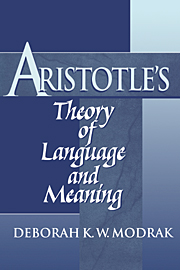4 - Three Types of Science
Published online by Cambridge University Press: 16 November 2009
Summary
How a mind grasps universals is addressed all too quickly in Posterior Analytics II 19. The challenge facing Aristotle is to fill out this quick account in a way that makes the acquisition of universals intelligible. This would be a challenge under any conditions; however, the importance of meeting this challenge is enormous for Aristotle, whose logic and theory of demonstrative science recognize only inferences through universals. The theory of meaning in the De Interpretatione does not identify significant sounds with universal terms; however, universal terms are much more common in ordinary discourse than are proper names for individuals, and Aristotle's claim that the mental state is the same for all humans who share a concept supports the identification of meanings with universals. Finally, and perhaps most significantly, knowledge requires universals. On this point, Aristotle (as we have seen) is in complete agreement with Plato. He differs in making experience the basis for the knowledge of universals. Posterior Analytics II 19 sketches the process involved, making no distinction between the universals required for ordinary discourse and those required for science, or between the universals required for one type of science or another. Elsewhere, Aristotle recognizes three types of theoretical science (mathematics, physical science, and metaphysics). These differ as their objects differ with respect to primacy, universality, and intelligibility. Posterior Analytics II 19 would lead us to expect that universals having the epistemic characteristics required by a particular science would be grasped through the inductive process (epagoge). Conversely, if this is not the case, the claim to generality of the Posterior Analytics account of first principles would be undermined.
- Type
- Chapter
- Information
- Aristotle's Theory of Language and Meaning , pp. 115 - 144Publisher: Cambridge University PressPrint publication year: 2000



